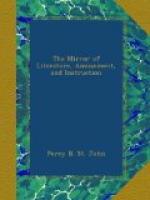For a few seconds the party were totally silent; for the clergyman and the foreigner were struck dumb with astonishment at the altered looks of the old gentleman, and were surprised to see him crushing the picture in both hands. He then, as if with an effort of great resolution, exclaimed:—“And it brings to my recollection the most miserable day of my life.”
* * * * *
The agitation of the old gentleman abated, and he replied: “I thank you for your kindness, sir, but my sorrow arises from self-reproach. I have inflicted injuries which can never be redressed.” He hesitated, as if wishing, but dreading to say more. Then changing the tone of his voice, as if he were about to speak on some totally different subject, he continued addressing himself to Colonel Rivolta:—“I presume, sir, you are a native of Genoa, or you are very familiar with that city.” “I was born,” replied the foreigner, “at Naples; but very early in life I was removed to Genoa, that I might be engaged in merchandize; for my patrimony was very small, and my relations would have despised me, had I endeavoured by any occupation to gain a livelihood in my native city.” “Then you were not originally destined for the army?” “I was not; but after I had been some few years in Genoa, I began to grow weary of the pursuits of merchandize, and indeed to feel some of that pride of which I had accused my relations, and I thought that I should be satisfied with very little if I might be free from the occupation of the merchant; and while I was so thinking, I met by chance an old acquaintance who persuaded me to undertake the profession of arms, to which I was indeed not reluctant. And so I left my merchandise, and did not see Genoa again for nearly two years. It was then that I was so much interested in that scene which the picture portrays; for in a very small house which is in the same street, directly opposite to that palace, there lived an old woman, whose name was ——”




